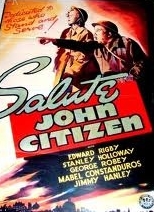Plot
The life of an ordinary family during the London Blitz. In the summer before that explosive September, elderly clerk Mr. Bunting loses his job at the department store where he's worked for over 40 years. George Bunting is the head of a happy home, with wife Mary, daughter Julie, and two sons, Chris and Ernest. When the Blitz hits London, we observe its effect on the family, and how they cope with the crisis. Mr. Bunting is rehired in his former job due to the shortage of manpower, though little else in his life is positive. Daughter Julie goes to work in a factory. The London blitz destroys everything in sight, and one of his sons, Chris, is killed. In the wake of this destruction, his other son, Ernest is converted from pacifism to the war effort.
Reception
According to Kinematograph Weekly the film "gave its backers a good run for their money" at the British box office in September 1942. [6]
The Monthly Film Bulletin wrote: "This film is so sincerely made and so well acted, especially by Edward Rigby as Mr. Bunting, that it is moving to a degree. The method of presentation, using a neighbour as the storyteller, may jar, but it was put to good use in covering war sequences. It should appeal with especial interest to the large part of the population of this country who have themselves enjoyed and suffered peace and war in similar circumstances to those which surrounded Mr. Bunting. The illusion of reality is disturbingly convincing. There is no doubt at all that it is all British." [7]
TV Guide noted "a nice little film – a simple telling of a modest family's attempts to cope with ongoing conflict." [8]
In his book Typical Men: The Representation of Masculinity in Popular British Cinema, Andrew Spicer concluded that the film's "popularity was limited by its obviously frugal budget, and uncharismatic central star." [9]
This page is based on this
Wikipedia article Text is available under the
CC BY-SA 4.0 license; additional terms may apply.
Images, videos and audio are available under their respective licenses.
